Submissions: 2022 November
Submissions: 2022 November
__________________________________________________________________________________________________
Please post your images here.
Please see this thread before posting images; posting images demonstrates your agreement with
the possible uses for your image.
If hotlinking to an image, please ensure it is under 500K.
Hotlinks to images over 500K slow down the thread too much and will be disabled.
Thank you!
_________________________________________________________________________________________________
<- Previous submissions
Please post your images here.
Please see this thread before posting images; posting images demonstrates your agreement with
the possible uses for your image.
If hotlinking to an image, please ensure it is under 500K.
Hotlinks to images over 500K slow down the thread too much and will be disabled.
Thank you!
_________________________________________________________________________________________________
<- Previous submissions
Know the quiet place within your heart and touch the rainbow of possibility; be
alive to the gentle breeze of communication, and please stop being such a jerk. — Garrison Keillor
alive to the gentle breeze of communication, and please stop being such a jerk. — Garrison Keillor
)NGC2403 and NGC2404 in H-alpha and continuum light
NGC2403 and NGC2404 in H-alpha and continuum light (final version)
NGC 2403 is a spiral galaxy in Camelopardalis. NGC 2404 is one of many large HII region within the galaxy.
The image is calculated with and without H-alpha information. By toggling between the two variants the correlation between HII gas clouds and bluish regions (containing young stars and probably also OIII gas) can be visualized.
Click on the animation for detailed information and full resolution pictures.
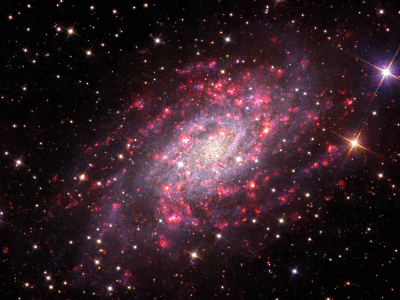
---
My Homepage
RSS news feed
NGC 2403 is a spiral galaxy in Camelopardalis. NGC 2404 is one of many large HII region within the galaxy.
The image is calculated with and without H-alpha information. By toggling between the two variants the correlation between HII gas clouds and bluish regions (containing young stars and probably also OIII gas) can be visualized.
Click on the animation for detailed information and full resolution pictures.

---
My Homepage
RSS news feed
M63 in H-alpha and continuum light
M63 in H-alpha and continuum light (final version)
M63 is a spiral galaxy in constellation Canes Venatici.
The image is calculated with and without H-alpha information. By toggling between the two variants the correlation between HII gas clouds and bluish regions (containing young stars and probably also OIII gas) can be visualized.
Click on the animation for detailed information and full resolution pictures.
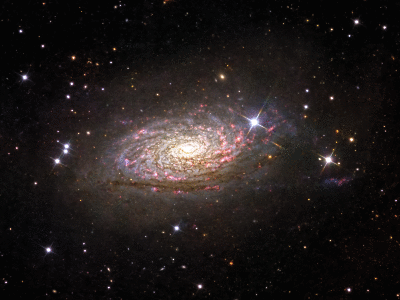
---
My Homepage
RSS news feed
M63 is a spiral galaxy in constellation Canes Venatici.
The image is calculated with and without H-alpha information. By toggling between the two variants the correlation between HII gas clouds and bluish regions (containing young stars and probably also OIII gas) can be visualized.
Click on the animation for detailed information and full resolution pictures.

---
My Homepage
RSS news feed
-
varadinagypal
- Ensign
- Posts: 81
- Joined: Fri Dec 20, 2013 9:29 pm
Re: Submissions: 2022 November
Cross eye 3D Sun in Calcium K
csillagtura.ro (will post later, for now on asztrofoto.hu)
Copyright: Pál VÁRADI NAGY Combining the image of the Sun from early October, one day apart, shows 3 things: (1) the Sun's surface changes too quickly to make this technique really viable, (2) the lens projects the image in an uneven way, meaning the Sun looks a bit like an egg coming towards the viewer, and (3) perhaps due to the differential rotation, the nose of the dolphin looks a bit tilted sideways, instead of being perfectly symmetrical.
These are images recorded with my own instruments, while in lunch break.
csillagtura.ro (will post later, for now on asztrofoto.hu)
Copyright: Pál VÁRADI NAGY Combining the image of the Sun from early October, one day apart, shows 3 things: (1) the Sun's surface changes too quickly to make this technique really viable, (2) the lens projects the image in an uneven way, meaning the Sun looks a bit like an egg coming towards the viewer, and (3) perhaps due to the differential rotation, the nose of the dolphin looks a bit tilted sideways, instead of being perfectly symmetrical.
These are images recorded with my own instruments, while in lunch break.
Re: Submissions: 2022 November
Partial Solar Eclipse above the Great Pyramid of Giza (Eclipse's rider) V2
Despite the very cloudy day and the extreme weather Conditions over Cairo two days ago, we were able to grab the shot at the exact moment of the eclipse with the great pyramid and the camel
The entire scene took three months of preparation, carefully calculated with split second precision via applications of planning as to the exact point of the eclipse, as well as the exact location of the camera!
Obviously special lenses and filters were used to be able to shoot this very dramatic scene.
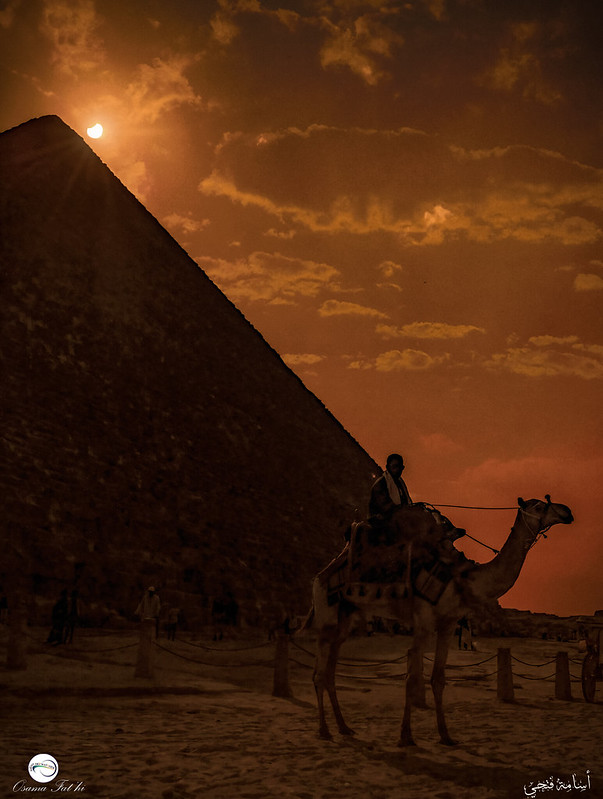 Partial Solar Eclipse above the Great Pyramid of Giza (Eclipse's rider) V2 by osama Fathi, on Flickr
Partial Solar Eclipse above the Great Pyramid of Giza (Eclipse's rider) V2 by osama Fathi, on Flickr
Gears:
Nikon z6 Mod
Sigma 28-70 mm
ND filter 10 stops ( Formatt Hitech 3 )
Settings :
Single shot( 1/1250 sec, ISO 500@ f8 )
Processing Softwares:
Adobe Photoshop , Tobaz DN
Credit
Osama Fathi
Social:
https://www.instagram.com/osama.fathi.nswatcher85/
https://www.facebook.com/NSWatcher/
Cairo, Egypt
Despite the very cloudy day and the extreme weather Conditions over Cairo two days ago, we were able to grab the shot at the exact moment of the eclipse with the great pyramid and the camel
The entire scene took three months of preparation, carefully calculated with split second precision via applications of planning as to the exact point of the eclipse, as well as the exact location of the camera!
Obviously special lenses and filters were used to be able to shoot this very dramatic scene.
 Partial Solar Eclipse above the Great Pyramid of Giza (Eclipse's rider) V2 by osama Fathi, on Flickr
Partial Solar Eclipse above the Great Pyramid of Giza (Eclipse's rider) V2 by osama Fathi, on FlickrGears:
Nikon z6 Mod
Sigma 28-70 mm
ND filter 10 stops ( Formatt Hitech 3 )
Settings :
Single shot( 1/1250 sec, ISO 500@ f8 )
Processing Softwares:
Adobe Photoshop , Tobaz DN
Credit
Osama Fathi
Social:
https://www.instagram.com/osama.fathi.nswatcher85/
https://www.facebook.com/NSWatcher/
Cairo, Egypt
Re: Submissions: 2022 November
Elephant's Trunk Nebula 
Nikon Z6II modified
Redcat 51
Antlia ALP-T Dual Band
Ioptron SGP
45×300″
Total Integration: 3h 45
 Trunk Nebula AB by Ahmed Waddah, on Flickr
Trunk Nebula AB by Ahmed Waddah, on Flickr
https://www.astrobin.com/emx6fz/
Facebook: https://www.facebook.com/waddah.photography
Astrobin: https://www.astrobin.com/users/WolfHeart/
IG: https://www.instagram.com/waddahphotography/
Nikon Z6II modified
Redcat 51
Antlia ALP-T Dual Band
Ioptron SGP
45×300″
Total Integration: 3h 45
 Trunk Nebula AB by Ahmed Waddah, on Flickr
Trunk Nebula AB by Ahmed Waddah, on Flickrhttps://www.astrobin.com/emx6fz/
Facebook: https://www.facebook.com/waddah.photography
Astrobin: https://www.astrobin.com/users/WolfHeart/
IG: https://www.instagram.com/waddahphotography/
-
ExplorerEGYWO
- Ensign
- Posts: 25
- Joined: Mon Jul 19, 2021 6:40 pm
Re: Submissions: 2022 November
 NGC 3938 with supernova by Wael Omar, on Flickr
NGC 3938 with supernova by Wael Omar, on FlickrI am so excited to be able to capture this image as i thought i discovered new supernova in NGC 3938. I only have very small imaging setup ( Redcat 51 focal length 250 mm with ZWO 294 mm pro camera) of course its not suitable for imaging distant galaxies or supernova but I direct my scope to sky every clear night with hope to find something new and interesting.
In October 31 , i traveled away from home 5 hours to dark sky and my plan was to image NGC 3938 ,NGC 4013 and NGC 4051.
After that i started to inspect each galaxy and compare with other recent images of this galaxy by NASA or professional Astrophotographers in Astrobin to find if there is something abnormal or new. I found this bright spot in NGC 3938 , it was not exist in any of other images I found on my search for NGC 3938. I was so thrilled . I thought it was a new supernova discovered by me but after careful search i found that another person called "Koichi Itagaki" discovered this supernova over 2 weeks ago . I am still too happy that I imaged this supernova with my small setup that is in no way compared to advanced scopes used to image these events.
Image settings :
4 subs , Gain 121 , Bin 1 , 10 min each.
Camera : ZWO 294 mm pro with optolong L pro filter.
Mount: Skywatcher HEQ 5.
Scope: Redcat 51 , focal length 250 mm.
Location : Wadi Elhitan , Fayoum ,EGYPT.
Credit: Wael Omar WO /https://www.instagram.com/waelomar_astrophotography/
-
ExplorerEGYWO
- Ensign
- Posts: 25
- Joined: Mon Jul 19, 2021 6:40 pm
Re: Submissions: 2022 November
 Orion unleashed his Fire by Wael Omar, on Flickr
Orion unleashed his Fire by Wael Omar, on FlickrMy image for Orion Constellation wide field . I drove 5 hours away from home to Dark sky to be able to capture this image. This was in October 30 , 2022 . The moon was still above Horizon at start of the night so I used the moon light to illuminate the foreground before moon set at 21:30 pm then I started to image the Orion constellation around 80 images. The night was full of beautiful bright Meteors and I blend them with the Orion image. All images were shot by same gears in same place at same night. Some of Meteors were imaged few days before but with same gears in same place.
Settings and Gears :
Camera : Sony A7 III Astro modified Ha with Sony FE 35 mm F 1.4.
Tracker : Star adventure 2i.
Foreground : ISO 640 , F2.8 , 6 seconds.
Sky imaged in same place same night: 80 images , ISO 1250 , F 2.8 , 120 seconds.
Location : Wadi Elhitan , Fayoum ,EGYPT.
Credit: Wael Omar WO /https://www.instagram.com/waelomar_astrophotography/
-
tommasostella
- Ensign
- Posts: 58
- Joined: Mon Nov 11, 2019 4:34 pm
Re: Submissions: 2022 November
The Crescent nebula
https://www.facebook.com/tommaso.m.stella
Copyright: Tommaso Stella
The lights were taken at the Valle degli Ulivi in Manduria (Taranto-Italy) at the end of August 2022 with a monochrome camera and Optolong narrow band filters at 3nm.
Lights: 75x300s Ha 3nm + 41x300s OIII 3nm
Sky: Bortle 6
Total exposure: 9,6 h
Telescope: Sky-Watcher Quattro 250P + GPU Coma corrector
Camera: QHY 294 Pro Mono
Filters: Optolong HO 3nm
Mount: Sky-Watcher AZ-EQ6 GT
https://www.facebook.com/tommaso.m.stella
Copyright: Tommaso Stella
The lights were taken at the Valle degli Ulivi in Manduria (Taranto-Italy) at the end of August 2022 with a monochrome camera and Optolong narrow band filters at 3nm.
Lights: 75x300s Ha 3nm + 41x300s OIII 3nm
Sky: Bortle 6
Total exposure: 9,6 h
Telescope: Sky-Watcher Quattro 250P + GPU Coma corrector
Camera: QHY 294 Pro Mono
Filters: Optolong HO 3nm
Mount: Sky-Watcher AZ-EQ6 GT
Re: Submissions: 2022 November
Milky Way from Vulpecula to Aquila
A 30°×28° wide-field view of Milky Way in the constellations Vulpecula, Sagitta and Aquila is presented in different color composites. That region is characterized dense dark nebulae at the galactic plane and only a few larger emission nebulae in constellation Vulpecula.
Click on the selected previews below for full resolution images (>100 MPixel), more views and detailed information.
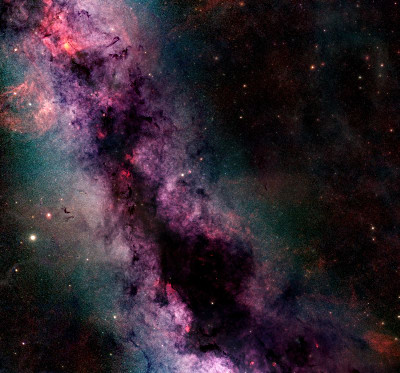
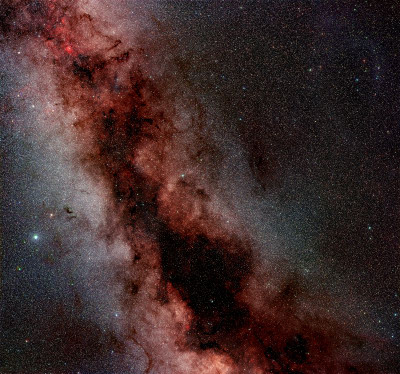
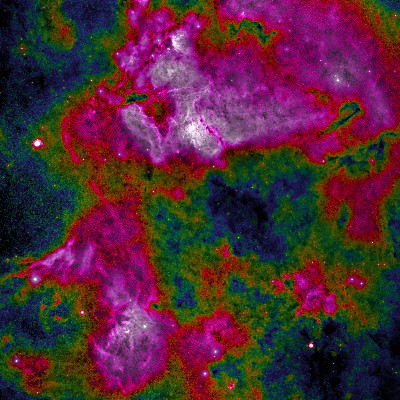
---
My Homepage
RSS news feed
A 30°×28° wide-field view of Milky Way in the constellations Vulpecula, Sagitta and Aquila is presented in different color composites. That region is characterized dense dark nebulae at the galactic plane and only a few larger emission nebulae in constellation Vulpecula.
Click on the selected previews below for full resolution images (>100 MPixel), more views and detailed information.



---
My Homepage
RSS news feed
-
Meiying Lee
- Ensign
- Posts: 65
- Joined: Sun Aug 15, 2021 8:28 am
Re: Submissions: 2022 November
Cloud-top flashes
Photo description:
In autumn and winter, the haze damage is serious in Taiwan, and it is not easy to have a clean sky to form green flash. At sunset on November 3rd, I actually got green flash and blue flash in the cloudy sky! The most special thing is that the sun did not fall into the sea, but into the clouds above the sea. That is to say, the green flash and blue flash this time occurred in a thin piece of sky between two cloud layers, which is really rare. At that time, the altitude of the sun was about 1.3 degrees.
The famous website Atmospheric Optics calls this phenomenon "Cloud-top flash". It was introduced like this: "Do not assume when the horizon is cloudy that a green flash will not be seen. Sometimes a rare cloud-top flash can occur as the sun sinks behind a distant cloud bank. They are not fully understood but might be a type of mock-mirage flash produced by an inversion layer overlaying the clouds. We need more observations and associated weather data to understand them better."
Equipment Details:
Canon EOS R7 + SIGMA 60-600mm F4.5-6.3 S DG OS HSM Sports
Post-processing Details:
The two photos were cropped and enlarged in PowerPoint and composited together. The blue flash is weak due to underexposure, so I adjusted the brightness so that the blue flash can be clearly displayed. So the colors of the clouds are slightly different in these two consecutive shots.
Time:5:06 pm, Nov 03, 2022
Location : Hsinchu, Taiwan
photographer : Meiying Lee (李美英)
Photo description:
In autumn and winter, the haze damage is serious in Taiwan, and it is not easy to have a clean sky to form green flash. At sunset on November 3rd, I actually got green flash and blue flash in the cloudy sky! The most special thing is that the sun did not fall into the sea, but into the clouds above the sea. That is to say, the green flash and blue flash this time occurred in a thin piece of sky between two cloud layers, which is really rare. At that time, the altitude of the sun was about 1.3 degrees.
The famous website Atmospheric Optics calls this phenomenon "Cloud-top flash". It was introduced like this: "Do not assume when the horizon is cloudy that a green flash will not be seen. Sometimes a rare cloud-top flash can occur as the sun sinks behind a distant cloud bank. They are not fully understood but might be a type of mock-mirage flash produced by an inversion layer overlaying the clouds. We need more observations and associated weather data to understand them better."
Equipment Details:
Canon EOS R7 + SIGMA 60-600mm F4.5-6.3 S DG OS HSM Sports
Post-processing Details:
The two photos were cropped and enlarged in PowerPoint and composited together. The blue flash is weak due to underexposure, so I adjusted the brightness so that the blue flash can be clearly displayed. So the colors of the clouds are slightly different in these two consecutive shots.
Time:5:06 pm, Nov 03, 2022
Location : Hsinchu, Taiwan
photographer : Meiying Lee (李美英)
Re: Submissions: 2022 November
The Hyades
https://www.mauricetoet.nl/DeepSky/i-v4vpBHW/A
Copyright: Maurice Toet This is a 2x3 pane mosaic of the Hyades star cluster. Due to high haze (bad transparency) during the four nights of capturing, the stars got bloated. However, this normally unwanted phenomenon helps to easily recognise the bright stars that form the V-shape head of the celestial bull. It gives the image an 'Akira Fujii' look. The bright yellow star is Aldebaran, which is Arabic for "the follower [of the Pleiades]". Aldebaran is physically unrelated to the Hyades, as it is located much closer to Earth and merely happens to lie along the same line of sight.
https://www.mauricetoet.nl/DeepSky/i-v4vpBHW/A
Copyright: Maurice Toet This is a 2x3 pane mosaic of the Hyades star cluster. Due to high haze (bad transparency) during the four nights of capturing, the stars got bloated. However, this normally unwanted phenomenon helps to easily recognise the bright stars that form the V-shape head of the celestial bull. It gives the image an 'Akira Fujii' look. The bright yellow star is Aldebaran, which is Arabic for "the follower [of the Pleiades]". Aldebaran is physically unrelated to the Hyades, as it is located much closer to Earth and merely happens to lie along the same line of sight.
-
Victor Lima
- Ensign
- Posts: 70
- Joined: Tue Apr 21, 2020 11:38 am
Re: Submissions: 2022 November
CATEGORY: Single Shot
SOCIAL IG: @victorlimaphoto
STORY:
In this image we can see the incredible transition between twilight and astronomical night in Piedras Rojas, in the Atacama Desert in Chile.
With Piedras Rojas above 4000 meters of altitude, the intensity and colors of the luminosity remaining on the horizon during twilight are impressive. Even so, it is possible to get very detailed images of the milky way at this time, since it is a region categorized as Bortle 1.
EXIF:
Piedras Rojas, Atacama Desert
18/10/22 - 22h
Canon 6Da / EF 16-35mm f/2.8L II
16mm / 13 sec / f/2.8 / ISO 4000
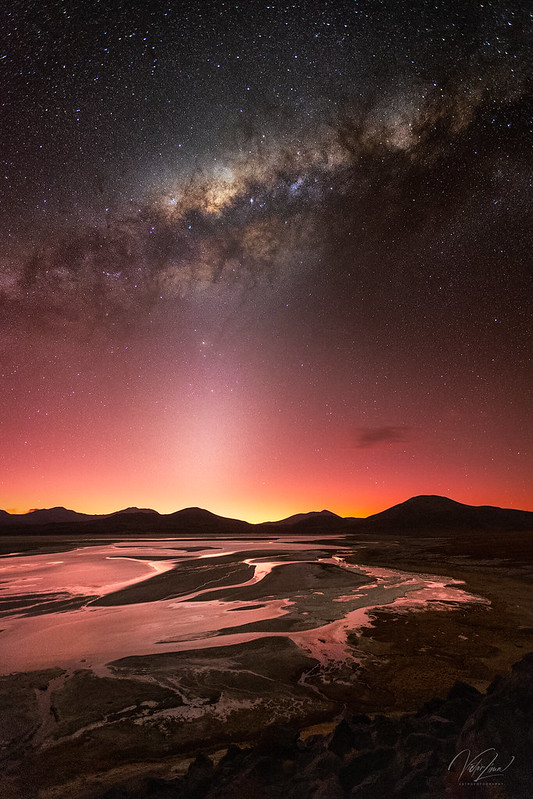 Piedras Rojas by Victor Lima, no Flickr
Piedras Rojas by Victor Lima, no Flickr
SOCIAL IG: @victorlimaphoto
STORY:
In this image we can see the incredible transition between twilight and astronomical night in Piedras Rojas, in the Atacama Desert in Chile.
With Piedras Rojas above 4000 meters of altitude, the intensity and colors of the luminosity remaining on the horizon during twilight are impressive. Even so, it is possible to get very detailed images of the milky way at this time, since it is a region categorized as Bortle 1.
EXIF:
Piedras Rojas, Atacama Desert
18/10/22 - 22h
Canon 6Da / EF 16-35mm f/2.8L II
16mm / 13 sec / f/2.8 / ISO 4000
 Piedras Rojas by Victor Lima, no Flickr
Piedras Rojas by Victor Lima, no Flickr-
Herbert_Walter
- Ensign
- Posts: 16
- Joined: Sat Nov 05, 2022 2:56 pm
Re: Submissions: 2022 November
Irregular Galaxy NGC 55 ...
... in constellation Sculptor
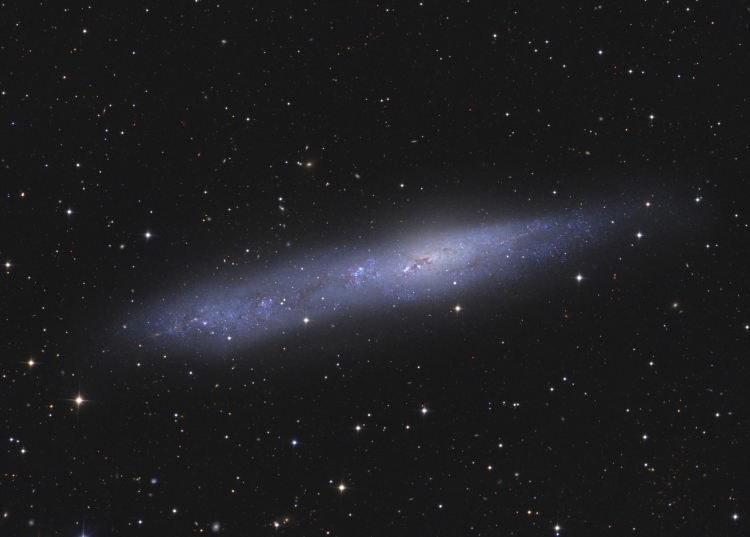
More info and larger image: https://www.skypixels.at/ngc55_info.html
NGC 55 is a nearly edge-on galaxy and appears asymmetrical with some knots and dustlanes.
An absolutly outstanding galaxie of the southern sky.
Telescope 20" Cassegrain f/3 (1500 mm)
Camera Moravian G2 8300 mono
Exposure L/R/G/B = 20/7/6/6 x 6min
Total 3h 54min
Software PixInsight
Location IAS Hakos Farm, Namibia
... in constellation Sculptor
More info and larger image: https://www.skypixels.at/ngc55_info.html
NGC 55 is a nearly edge-on galaxy and appears asymmetrical with some knots and dustlanes.
An absolutly outstanding galaxie of the southern sky.
Telescope 20" Cassegrain f/3 (1500 mm)
Camera Moravian G2 8300 mono
Exposure L/R/G/B = 20/7/6/6 x 6min
Total 3h 54min
Software PixInsight
Location IAS Hakos Farm, Namibia
Last edited by Herbert_Walter on Sun Nov 06, 2022 6:41 am, edited 5 times in total.
Re: Submissions: 2022 November
HMSTG 343+2 & FeSt 2-246
This area seems very rarely imaged and there is very little information regarding these rarely imaged objects. The trunk object is the Dark Tower of Scorpius.
Total integration time 6h40 captured with H-alpha and O3 filters on a ASI294MM camera.
Location of capture: Bay of Islands / New Zealand.
https://astrob.in/ghufl2/B/

https://cdn.astrobin.com/thumbs/KF4pvsW ... se7jhb.jpg
This area seems very rarely imaged and there is very little information regarding these rarely imaged objects. The trunk object is the Dark Tower of Scorpius.
Total integration time 6h40 captured with H-alpha and O3 filters on a ASI294MM camera.
Location of capture: Bay of Islands / New Zealand.
https://astrob.in/ghufl2/B/

https://cdn.astrobin.com/thumbs/KF4pvsW ... se7jhb.jpg
Last edited by bystander on Sun Nov 06, 2022 1:59 am, edited 1 time in total.
Reason: Please, no hot links to images > 500 kb. Substituted smaller image.
Reason: Please, no hot links to images > 500 kb. Substituted smaller image.
-
barretosmed
- Science Officer
- Posts: 463
- Joined: Thu Oct 12, 2017 6:04 pm
Re: Submissions: 2022 November
MOON IN FALSE COLOR - MINERAL MOON
BEST DETAILS
https://www.astrobin.com/full/o23cx5/0/
EQUIPMENT:
Esprit 150mm triplet
Zwo asi 6200mc
CEM120 mount
LOCATION: Munhoz - MG - Brazil
DATE: 11/04/2022
Author: Fernando Oliveira de Menezes
(Organizing author of the book Amateur Astrophotography in Brazil)
https://clubedeautores.com.br/livro/ast ... -no-brasil
BEST DETAILS
https://www.astrobin.com/full/o23cx5/0/
EQUIPMENT:
Esprit 150mm triplet
Zwo asi 6200mc
CEM120 mount
LOCATION: Munhoz - MG - Brazil
DATE: 11/04/2022
Author: Fernando Oliveira de Menezes
(Organizing author of the book Amateur Astrophotography in Brazil)
https://clubedeautores.com.br/livro/ast ... -no-brasil
-
astrohokie
- Ensign
- Posts: 32
- Joined: Thu Oct 14, 2021 10:32 pm
Re: Submissions: 2022 November
Soul Nebula (IC 1848)
An emission nebula located in Cassiopeia.
https://www.flickr.com/photos/194543639@N07/
https://www.instagram.com/mark_hoffman_photography/
Copyright: Mark Hoffman, Instagram: @Mark_Hoffman_Photography
 SHO_RGB_stars by mark h, on Flickr
SHO_RGB_stars by mark h, on Flickr
Soul Nebula (IC 1848)
Williams Optics Z73
EQ6R-Pro
ZWO ASI Autofocuser
ZWO ASI 1200MM
ASI 1600MM Pro
ASI 7 position EFW
36 mm Astronomik 6nm Ha, O3, S2 filters
Total Integration Time = 31 hours
Ha Integration Time = 75 * 480sec
O3 Intergration Time = 140 * 240sec
S2 Integration Time = 80 * 540sec
Virginia, USA
Bortle 7
Capture dates: 10/14/2022,10/15/2022, 10/18/2022, 10/19/2022, 10/20/2022, 10/21/2022, 10/22/2022, 11/3/2022, 11/4/2022, 11/5/2022
SHO palette using LRGB combo in Pixinsight with curves, saturation, deconvolution, StarXterminator, NoiseXterminator, DBE, MMT.
An emission nebula located in Cassiopeia.
https://www.flickr.com/photos/194543639@N07/
https://www.instagram.com/mark_hoffman_photography/
Copyright: Mark Hoffman, Instagram: @Mark_Hoffman_Photography
 SHO_RGB_stars by mark h, on Flickr
SHO_RGB_stars by mark h, on FlickrSoul Nebula (IC 1848)
Williams Optics Z73
EQ6R-Pro
ZWO ASI Autofocuser
ZWO ASI 1200MM
ASI 1600MM Pro
ASI 7 position EFW
36 mm Astronomik 6nm Ha, O3, S2 filters
Total Integration Time = 31 hours
Ha Integration Time = 75 * 480sec
O3 Intergration Time = 140 * 240sec
S2 Integration Time = 80 * 540sec
Virginia, USA
Bortle 7
Capture dates: 10/14/2022,10/15/2022, 10/18/2022, 10/19/2022, 10/20/2022, 10/21/2022, 10/22/2022, 11/3/2022, 11/4/2022, 11/5/2022
SHO palette using LRGB combo in Pixinsight with curves, saturation, deconvolution, StarXterminator, NoiseXterminator, DBE, MMT.
-
martinkonrat
- Ensign
- Posts: 39
- Joined: Sun Sep 11, 2022 12:53 pm
Re: Submissions: 2022 November
https://astrob.in/o773u2/0/
The Rosette Nebula is a vast emission nebula located about 5,200 light years away.
The star forming region lies near a large molecular cloud in the constellation Monoceros, the Unicorn.
It is closely associated with the young open star cluster NGC 2244.
Also known as the Satellite Cluster, NGC 2244 appears in the centre of the Rosette.
The hot young stars of the cluster were formed from the nebula’s material in the last 5 million years.
The stars in the Satellite Cluster are responsible for the nebula’s glow.
🗓 November, 1st to 3rd. 2022
 Giruá, RS, Brazil. Bortle 4.
Giruá, RS, Brazil. Bortle 4.
 ASKAR FRA400 refractor (with reducer, 280mm DF f3.9)
ASKAR FRA400 refractor (with reducer, 280mm DF f3.9)
 asi294mm camera
asi294mm camera
🕶 Antlia 3nm Ha, Oiii and Sii filters
- 35 x 300s Ha
- 40 x 300s Oiii
- 37 x 300s Sii
- total integration time: ~9,33H
 pixinsight, photoshop
pixinsight, photoshop
The Rosette Nebula is a vast emission nebula located about 5,200 light years away.
The star forming region lies near a large molecular cloud in the constellation Monoceros, the Unicorn.
It is closely associated with the young open star cluster NGC 2244.
Also known as the Satellite Cluster, NGC 2244 appears in the centre of the Rosette.
The hot young stars of the cluster were formed from the nebula’s material in the last 5 million years.
The stars in the Satellite Cluster are responsible for the nebula’s glow.
🗓 November, 1st to 3rd. 2022
🕶 Antlia 3nm Ha, Oiii and Sii filters
- 35 x 300s Ha
- 40 x 300s Oiii
- 37 x 300s Sii
- total integration time: ~9,33H
Last edited by bystander on Sun Nov 06, 2022 2:04 am, edited 1 time in total.
Reason: Please, no hot links to images > 500 kb. Uploaded image as an attachment.
Reason: Please, no hot links to images > 500 kb. Uploaded image as an attachment.
-
martinkonrat
- Ensign
- Posts: 39
- Joined: Sun Sep 11, 2022 12:53 pm
Re: Submissions: 2022 November

NGC 253, also named Sculptor Galaxy is one of the brightest spiral galaxies visible. This dusty galaxy lies 11 million light-years away.
About 70 thousand light-years across, NGC 253 is the largest member of the Sculptor Group of Galaxies.
The high dust content accompanies frantic star formation, earning NGC 253 the designation of a starburst galaxy.
This data was acquired by me in my hometown and processed by a friend and experienced Astrophotographer Maicon Germiniani who did a wonderfull job.
It was also the first produtcion with my new telescope: a FotonAstro 200mm F4 newtonian astrograph
🗓 October, 22nd to 25th. 2022
🕶 Askar L,R,G,B filters
- 46 x 180s Luminance frames
- 31 x 180s Red frames
- 21 x 180s Green frames
- 36 x 180s Blue frames
- total integration time: ~6,7h
-
sergio.diaz
- Asternaut
- Posts: 4
- Joined: Sun Sep 09, 2012 2:23 pm
Re: Submissions: 2022 November

https://astrob.in/nm3lxw/0/rawthumb/hd/get.jpg?insecure
Invisible light is needed to reveal the venusian marble. Here, ultraviolet and infrared data from different flybys of the JAXA's AKATSUKI Venus Climate Orbiter mission have been blended to show intriguing cloud features in day and night sides, respectively.
Such a different view from the featureless crescent we are used to seeing through the telescope, in visible light. Truly an alien world.
Thousands of images were manually reviewed for JAXA's DARTS archive looking for the ones where the size of the planet was big enough to fill the small 1-megapixel sensor of the instruments and the amount of detail on the atmosphere were good enough to start with. I finally settled using data from different flybys, trying to get the best images from the UVI instrument for the dayside, and from the IR2 for the nightside. Preprocessing, alignment and channel mixing were made in PixInsight separately for each instrument, while the composition of the day and night sides was made in Adobe Photoshop. To cope with the lack of resolution of the instruments, the image was upscaled by ensembling several super-resolution machine learning models (PSNR-small, PSNR-large & Noise-cancel from ISR python package, and ESRGAN by Wang, X. et al.), and the output carefully checked for artifacts.
Data time range: September 2016, October 2017
Telescope and Instruments: JAXA AKATSUKI VCO, UVI & IR2
Channels: UVI: 283 nm, 365 nm; IR2: 1.735 μm, 2.26 μm
Data credits: ISAS/JAXA/Sergio Díaz
Full size image: https://astrob.in/nm3lxw/0/
Last edited by bystander on Sun Nov 06, 2022 1:29 pm, edited 1 time in total.
Reason: Please, no hot links to images > 500 kb. Substituted smaller image.
Reason: Please, no hot links to images > 500 kb. Substituted smaller image.
Re: Submissions: 2022 November
Prominent lunar features labeled on the Waxing Gibbous Moon. This was an interesting project to undertake as I had to research the various craters, mountains, and seas.
Celestron NexStar 8se
2x Barlow
EOS 5d mark iv
SiriL
Instagram: https://www.instagram.com/danielhu.photography/
Fullsize image: https://flic.kr/p/2nXEZ1M
Celestron NexStar 8se
2x Barlow
EOS 5d mark iv
SiriL
Instagram: https://www.instagram.com/danielhu.photography/
Fullsize image: https://flic.kr/p/2nXEZ1M
Milky Way from Monoceros to Gemini
Milky Way from Monoceros to Gemini
A 21°×40° view of the Milky Way in the constellations Monoceros, Orion and Gemini is presented in different color composites. That part of the sky is full of famous HII regions (e.g. Monkey Head Nebula, Cone Nebulae, Rosette Nebula, Seagull Nebula), but there are only a few reflection nebulae.
Click on the selected previews below for detailed information, full resolution pictures (>100 MPixel) and more views from that region.
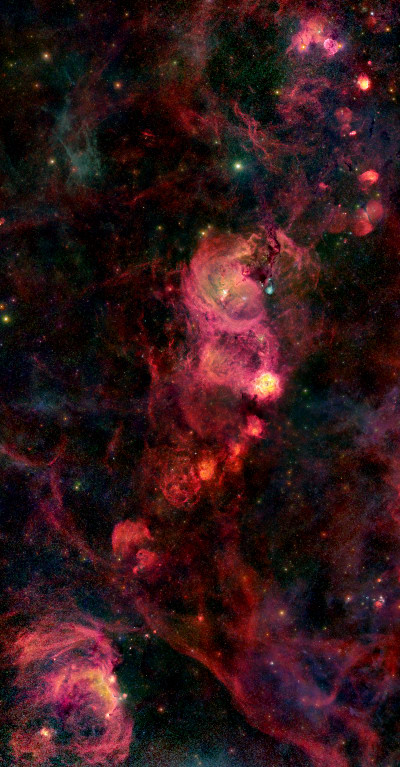
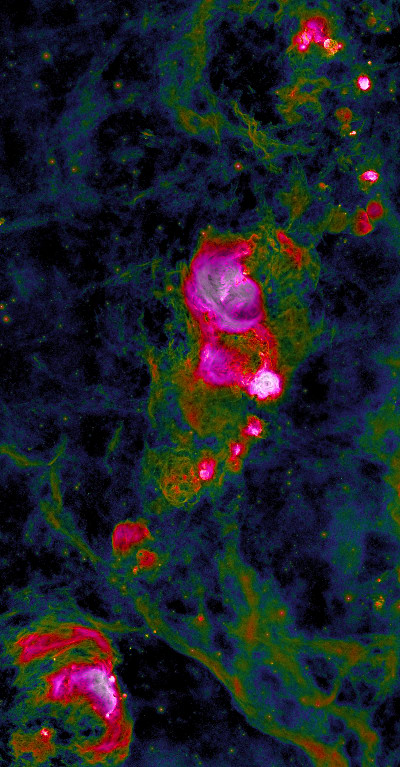
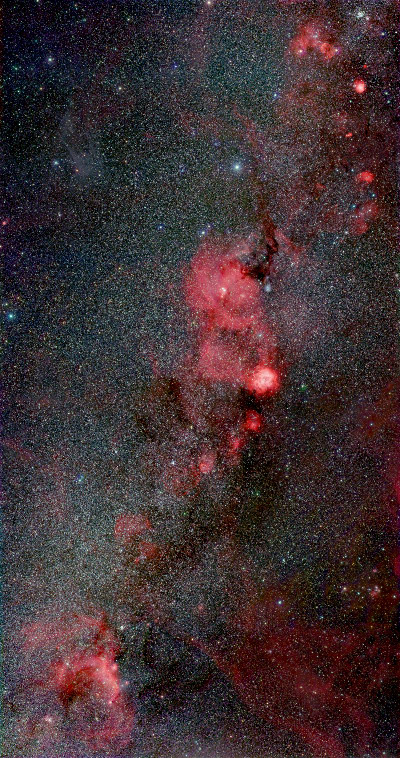
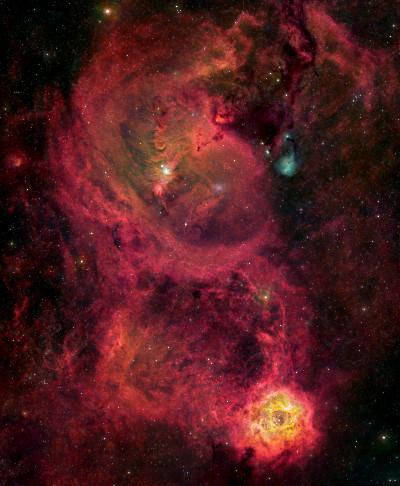
---
My Homepage
RSS news feed
A 21°×40° view of the Milky Way in the constellations Monoceros, Orion and Gemini is presented in different color composites. That part of the sky is full of famous HII regions (e.g. Monkey Head Nebula, Cone Nebulae, Rosette Nebula, Seagull Nebula), but there are only a few reflection nebulae.
Click on the selected previews below for detailed information, full resolution pictures (>100 MPixel) and more views from that region.




---
My Homepage
RSS news feed
Re: Submissions: 2022 November
My process of the close-up view of Centaurus A using HST legacy data with raw subs. RGB combined using stacks from the following WFC3 filters: 657 nm (mapped to Red), 547 nm (mapped to Green) and 487 nm (mapped to Blue) filters, respectively. The WFC3 camera also took data in the ultraviolet and in the IR to show glowing young stars and to pierce through the dust. I took the 814 nm data and applied as ~50% luminance blend to show 'through' the thicker dust regions a little better.
Centaurus A (NGC 5128) - HLA data
https://cdn.astrobin.com/images/85438/2 ... f19a11.jpg
 by C. O'Dwyer
by C. O'Dwyer
Centaurus A (NGC 5128) - HLA data
https://cdn.astrobin.com/images/85438/2 ... f19a11.jpg
 by C. O'Dwyer
by C. O'Dwyer-
ashwindeshpande
- Ensign
- Posts: 11
- Joined: Thu Jun 11, 2020 6:18 pm
-
ashwindeshpande
- Ensign
- Posts: 11
- Joined: Thu Jun 11, 2020 6:18 pm



